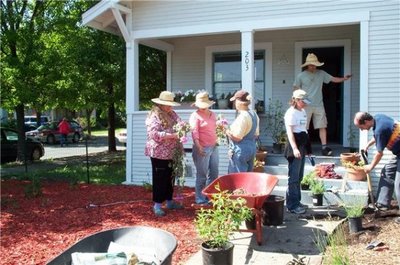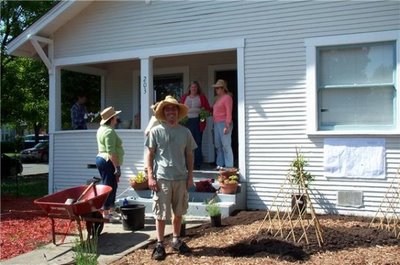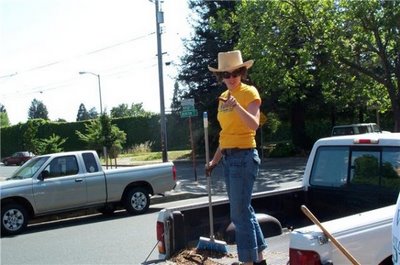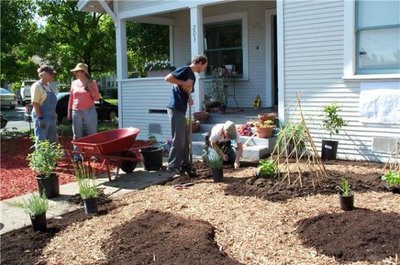By Debra Birkinshaw
(See photos of the garden planting below.)
JoAnna Macy says of the Great Turning, “It is a name for the transition from the industrial growth society to a life-sustaining society. It identifies the shift from a self-destroying political economy to one in harmony with Earth and enduring for the future. It unites and includes all the actions being taken to honor and preserve life on Earth…Now, in this very time, three rivers — anguish for our world, scientific breakthroughs, and ancestral teachings — flow together. From the confluence of these rivers we drink and awaken to what we once knew: we are alive in a living Earth, source of all we are and know. Despite centuries of mechanistic conditioning, we want to name, once again, this world as holy.”
There is a grand yet attainable project going on in our county that is a part of this Great Turning, as in the turning over of soil, the turning of thirsty lawns into edible Edens, and the turning toward transition in our community. A collaborative project of Green Sangha Sonoma County, SRJC Neighbors For Sustainability, and Edible Landscapes, the Garden Wheel Project incorporates the teaching of permaculture principles with hands-on gardening, food exchange, and food donation.
The Garden Wheel Project is already building connections, community, and increased neighborhood food security by bringing neighbors together to install food-focused gardens on at least four JC Neighborhood residential properties. The gardens will emphasize neighborhood food production, low water use techniques, and plants that attract beneficial insects, birds, and other beneficial wildlife to the area.
Garden Wheel participants are working to secure initial funding through a CAB, (Community Advisory Board) Community Improvement grant. Funding for the replacement of thirsty lawns with low-water-use plants and/or permeable landscape materials, such as mulch and bark, is also available through a Green Exchange Rebate Program offered by the City of Santa Rosa.
The gardens will be replicable models for neighborhood food production in our county, and designs and plant choices will produce as diverse a harvest as possible, which will facilitate trading. Surplus from the gardens can be traded at the JC Neighborhood produce swaps, (launching in July 2009) and donated to FISH, a neighborhood organization that provides food to people who need it. There is a vision to include some school gardens in the future, to safeguard this practice for future generations.
As the coordinator for the Stewardship of the Earth project, part of the New Social Contract being revived at our Peace and Justice Center, I want to draw for our readers the connection between peace and justice work and this project. There can be no peace without sustainability. We work together to assure our community that there is an abundant flow of resources locally; therefore, there is no need to panic, take up arms, and invade other countries in search of plunder. It is time to turn over a new leaf.
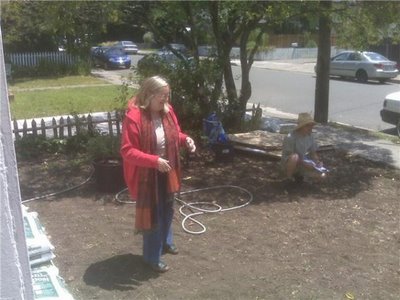
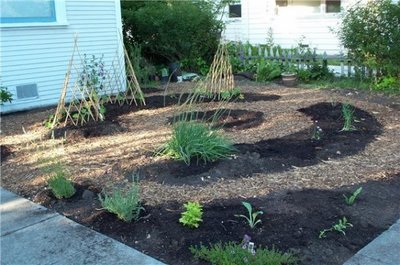 Planting is under way. There are many edibles in this garden now-oregano, thyme, basil, dill, cilantro, rosemary, sweet potatoes, beans, peas and tomatoes. There are also raspberries, a lemon verbena, and an aloe plant. I want to plant edamame for some more protein.
Planting is under way. There are many edibles in this garden now-oregano, thyme, basil, dill, cilantro, rosemary, sweet potatoes, beans, peas and tomatoes. There are also raspberries, a lemon verbena, and an aloe plant. I want to plant edamame for some more protein.
*****
Debra Birkinshaw is a board member of the Peace and Justice Center of Sonoma County and an organizer for Green Sangha Sonoma County. To get involved in the Garden Wheel Project, you can email her at: cognizant2@hotmail.com.

